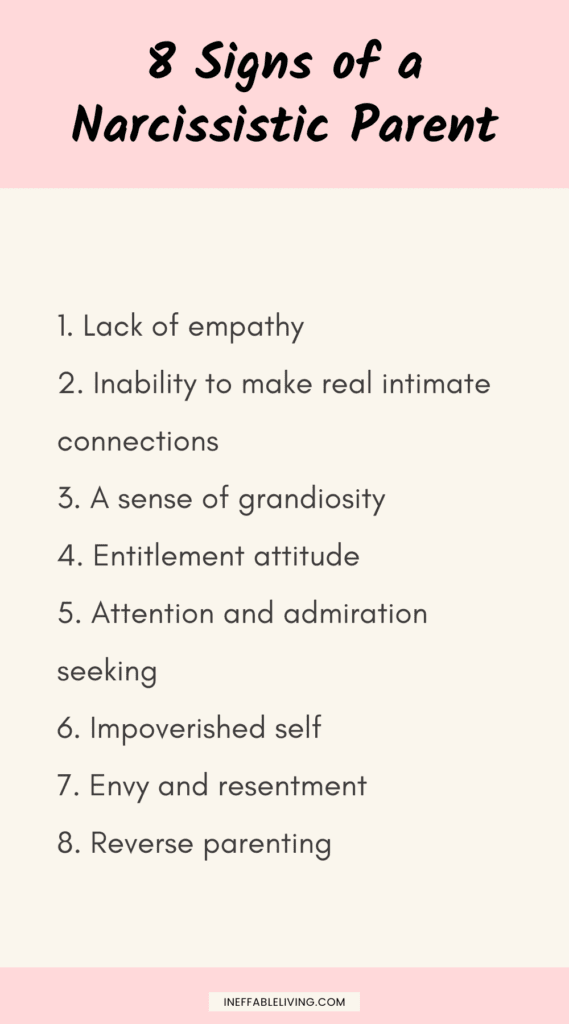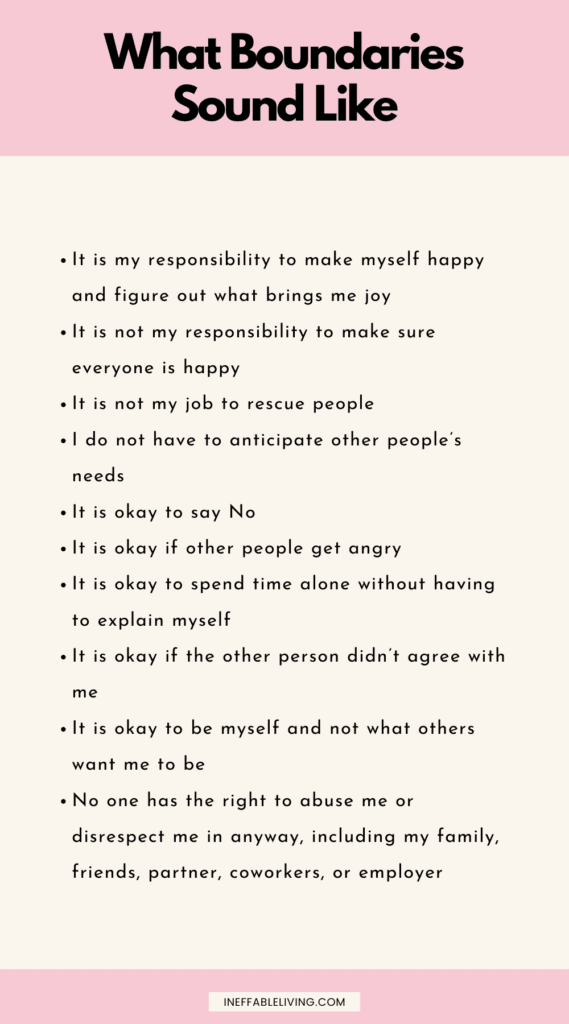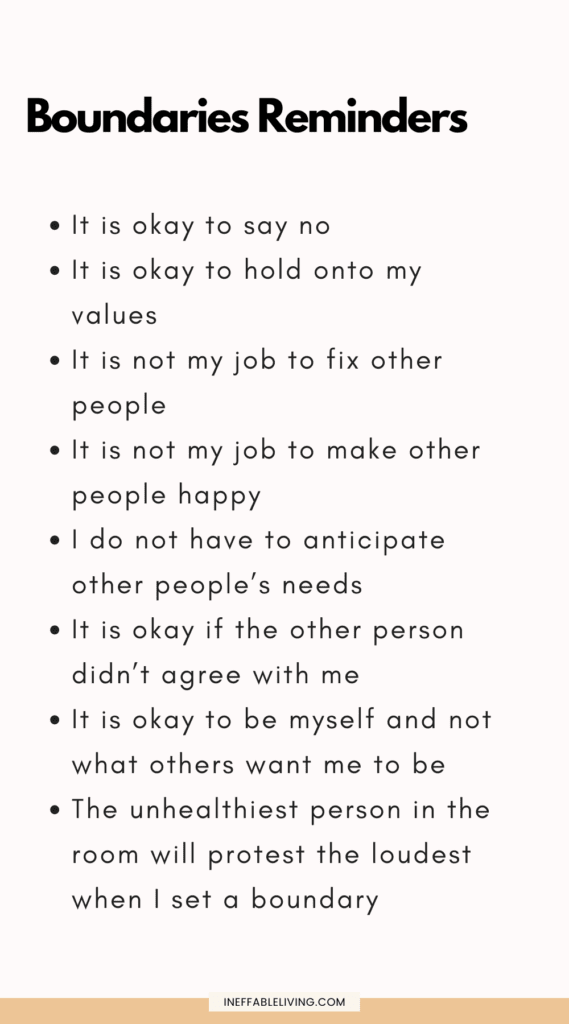Today, you’re going to learn all about setting boundaries with narcissistic parents using practical strategies.
How To Tell If Your Parent Is Narcissistic?
Here are some common characteristics to look out for:
1. Lack of empathy: Narcissistic parents often struggle to understand or connect with their child’s emotions and needs. They may dismiss or minimize their child’s feelings.
2. Excessive need for admiration: Narcissistic parents crave constant attention, praise, and validation. Their self-worth is often tied to external approval, leading them to seek admiration from others, including their children.
3. Grandiose sense of self-importance: These parents tend to have an exaggerated view of their own accomplishments, talents, and importance. They may constantly remind their children of their own achievements and expect their children to admire and follow in their footsteps.
4. Manipulative behavior: Narcissistic parents can manipulate their children to serve their own needs and desires. They may use guilt, emotional blackmail, or other tactics to control their child’s actions and choices.
5. Lack of boundaries: Narcissistic parents often disregard their child’s personal boundaries. They might invade their child’s privacy, manipulate their relationships, or fail to respect their autonomy.
6. Difficulty taking responsibility: When conflicts arise, narcissistic parents may struggle to take responsibility for their actions or admit any wrongdoing. Instead, they may blame others, including their own children, for any problems.
7. Constant need for control: Narcissistic parents often feel the need to control every aspect of their child’s life. They may make decisions without considering their child’s wants or needs, insisting on authority over their child’s choices.

Related: Is My Mother A Narcissist Quiz
What Are Boundaries?
Boundaries help define us as individuals.
They make it clear that we’re responsible for our own thoughts, feelings, and behavior, but we’re not responsible for those of others.
Without boundaries, you lose your true self – who you are, what you need, what you believe, and what matters most to you.
Top 10 Tips For Setting Boundaries With Narcissistic Parents
Emotional boundaries are the protective emotional limits that we use to define how we regulate our acceptance of how others treat us.
It is your responsibility to show others how to treat you and you do that by first acknowledging and honoring your own needs.
Narcissists do not manipulate everyone. They only manipulate you because they know they can.
The only way to stop a narcissist, and anyone for that matter, from walking all over you, is through the establishment and maintenance of healthy boundaries.
Here are some tips for setting boundaries with a narcissistic parent:
#1. Clearly Communicate Your Boundaries
Clearly tell the narcissist what you will and will not tolerate, and what the consequences for violating these limits will be.
It might feel uncomfortable at first, so you can do it over the phone, or by email, or whatever feels the least stressful to you.
Related: Top 35 Boundaries Affirmations To Help You Become More Assertive
#2. Enforce Your Rules
Stand firm and show the narcissist that you’re serious. If they violate these boundaries let them face the consequences.
This might include leaving the situation if they start getting abusive, or hanging up the phone.
Do not allow yourself to be pulled into the narcissist’s rage, manipulation or drama.
Related: Top 25 Tips On How To Set Boundaries In A Toxic Relationship? (+FREE Worksheets PDF)
#3. Be Compassionate and Forgiving With Yourself When You Falter
Setting boundaries with the narcissist for the first time might not come easily and might make you feel uncomfortable
You’re bound to make mistakes and you are likely to slip back into old patterns for a while. That is perfectly fine. It’s part of the learning process, just keep practicing.

Related: How To Be Gentle With Yourself? Top 5 Ways To Practice Self-Compassion
#4. Decide on A Strategy to Deal With Conflicts
Whether they were mild disagreements or fight, the most important aspect about conflicts is how they leave you feeling.
A conflict with your narcissistic parent might leave you feeling upset, helpless, wrong, or inadequate.
In approaching conflicts with your narcissistic parent, you have to consider the way you’re left feeling and decide which strategy is best to use.
Strategy 1: Avoid Conflicts.
Assess the importance of winning an argument with your narcissistic parent If winning is important for you, ask yourself how important is it for you to “win” this time?
If you decide that winning isn’t that important and it’s best to avoid the conflict, you can try the following:
Fogging the situation, which means to obscure the discussion by changing the topic, or focusing on an irrelevancy, or bringing something offbeat into the conversation.
Distracting yourself, by saying you remembered something that needs to be taken care of, or you need to use the bathroom, or any other distraction.
Ignoring factual errors – your parent is unlikely to admit any errors.
Accepting a differing perspective.
Strategy 2: Manage Your Feelings.
Don’t reveal and show your feelings on your face when you’re having a conflict – keep them private.
Your parent has never been moved by your feelings and may have used them against you to make you appear even more inadequate. So revealing your feelings will not be helpful.
Instead manage your feelings later when you’re alone.
Things To Avoid
Retaliating
Retaliation is when you are hurt and do or say something in order to make the other person hurt as well.
However, the short-term satisfaction will not last and the act can make the relationship worse, which makes such strategy isn’t worth it.
The best revenge is to build your self and to create your desired life – this is positive revenge.
Confronting
Even if you are experienced in constructive confrontation, it’s not the best strategy when it comes to dealing with your narcissistic parent.
If you objectively recall any confrontation you’ve had with your narcissistic parent, you are most likely to come to the realization that confrontation is ineffective and that you probably left with residual negative feelings that lingered.
Related: Better Communication In Relationships: Top 4 Steps to Communicate Effectively With Anyone?

#5. Use Nondefensive Communication
It’s likely that your parents are still pressuring you to have their way by criticizing, threatening, trying to make you feel guilty/inferior, going offensive, etc.
You’ve probably become an expert at explaining yourself, rationalizing, giving excuses, and even apologizing.
You probably also know that this doesn’t work. It only forces you onto the defensive and that is a sign of weakness and an eagerness to avoid criticism.
Here are some common defensive phrases:
- I didn’t.
- I never said/did that.
- I am not.
- I didn’t mean to.
- I was just trying to . . .
- I only did it because . . .
- Why do you always . . . ?
- How can you say something like that about me?
- Why can’t you be reasonable?
Each time you’re defensive, you create an opening for the other person and get yourself stuck into an endless loop of accusation and defense.
The Alternative
Nondefensive phrases can bring the fight to a stop. The following are some examples:
- I see.
- I understand.
- Really?
- That’s interesting.
- I’m sure you see it that way.
- You’re entitled to your opinion.
- I know you’re upset.
- I’m sorry you’re upset.
- Let’s talk about this when you’re calmer.
- This subject is off-limits.
- I’m not having this conversation.
- Guilt tripping and playing the victim are not going to work anymore.
Related: Top 5 Tips On How To Be Assertive Without Being Rude
#6. Capitalize On Nonverbal Signals
Avoiding non verbal cues when interacting with your narcissistic parent will help you catch less negative feelings from them and communicate less of your own negative feelings:
* Avoid eye contact, especially sustained eye contact,
* Angle your body away from your parent,
* Adopt a relaxed body position and neutral facial expression,
* If you are forced to look at your parent, focus on areas other than the eyes, such as an ear, or chin, or the middle of the forehead,
* Put a physical object between you and your parent,
* Distract yourself by thinking about something pleasant or zoning out.
* Avoid nonverbal behaviors that are likely to arouse your parent’s anger, such as sulking, mumbling, etc.
Remind yourself that you don’t need to win, you are just trying to tolerate the situation for the moment.
Related: How To Validate Someone’s Feelings Without Agreeing? (+Examples of Validating Statements)
#7. Deal With Unreasonable Demands and Intrusive Questions
Unreasonable Demands
Being unwilling to accept you as separate and distinct from them, even when you are an adult and have a life and other responsibilities, your narcissistic parent may still expect you to make them a priority, drop everything, and meet all their needs.
Unreasonable demands that your narcissistic parent might make include doing things that they could do themselves, being responsible for their physical and emotional welfare, acting on their desires and wishes.
No matter how much you give your narcissistic parent, it never seems to be enough, and trying to meet all of their demands may even be detrimental to other aspects of your life.
Intrusive Questions
The narcissistic parent’s lack of understanding and respect for others’ boundaries, might make them feel entitled to ask intrusive questions and would even feel offended if you do not immediately give the desired answers.
Intrusive questions involve questions that are intimate, personal, sensitive information about yourself or others that you may not want to share.
* Understand that your parent considers you an extension of themselves and so they are unable or unwilling to accept you as separate from the parent.
* Ask yourself whether you still relate to your parent as if you were a child, feeling the need to comply with the parent’s demands or answer their questions.
* Work on setting reasonable limits and boundaries for how the parent is to relate and behave with you.
Disclosed personal and intimate thoughts and feelings to your narcissistic parent is not advised, because they are not likely to understand your thoughts or empathize with your feelings and might even use the information against you.
This isn’t to say that you need to cut your parent off from your personal life altogether. It simply means that you should share with your narcissistic parent what you wouldn’t mind being revealed to the rest of the world.
Related: How To Stop Being A People Pleaser? Top 21 Proven Ways to Stop People Pleasing (+Free Worksheets)

#8. Stay Emotionally Distant
Do share any of your feelings or personal thoughts with the narcissist. Do not try to rationalize with them or let them see you get upset. They see these emotions as weaknesses and will use them against you.
When talking with the narcissist, keep your voice monotone and if you can, don’t make eye contact.
1. Do not offer advice or tips
They will take it as criticisms and lash out against you.
2. Do not joke with them
Narcissists cannot laugh at themselves and they get easily offended.
3. Postpone and delay rather than confront
If the conversation isn’t going well, make excuses to buy you time and delay the conversation so they can cool down.
4. Be direct and concise when you speak to them
Say what you have to say and leave. Don’t try to rationalize, or elaborate, or fill in uncomfortable silences. Don’t negotiate with them, you’ll lose.
Related: What Do Boundaries Sound Like? + 35 Boundaries Examples
#9. Manage and Contain Your Negative Feelings
This process will help you contain and manage your negative feelings, especially when they occur as you interact with your narcissistic parent.
First, practice the process by thinking back to an interaction with your narcissistic parent and notice what feelings you may still carry about that interaction.
The following is the process to try with someone other than your parent first, when you think that you are ready to implement it:
1. Accept the responsibility for your feelings and do not think that someone else is causing them.
2. Identify and name the feelings, for example, hurt, anger, frustration, shame, fear, guilt, etc.
3. Identify the thoughts and beliefs associated with the feeling, such as “I’m inadequate,” or, “I’m powerless,” or, “I’m worthless.”
4. Challenge the validity of the thought or belief. For instance, you might feel powerless at this moment, but this does not mean that you are powerless overall. So the thought is not valid.
5. Replace your negative thoughts with more positive and reasonable ones, such as “I feel powerless sometimes.” Notice how you feel when you have the more reasonable thought.
The more you practice this process, the more easily and quickly it can be used.
Examples of negative beliefs
Negative Belief: I need others’ approval.
Self-affirmation: I like and want this person’s approval, but I will be okay even if I don’t get it.
Negative belief: I must be perfect.
Self-affirmation: I will work to be better, but I still like myself even when I am not perfect – good enough is sufficient.
Negative belief: I need to take care of others.
Self-affirmation: Showing confidence that the other person can fix it can be the best help I can give them.
Negative belief: I am helpless to make changes.
Self-affirmation: I have not yet found a way to do change, but I believe in my ability to make choices and change
Negative belief: I’m not as worthwhile as others.
Self-affirmation: Mistakes are one of our best tools to learn and most mistakes can be corrected and they don’t make me less worthwhile.
Related: How to Challenge Negative Core Beliefs? The Ultimate Guide To Change Negative Beliefs
#10. Manage Your Expectations of The Narcissist
1. Accept that what you see is what you get
Accept that the narcissist will never consider your feelings or take responsibility for anything they do and apologize for hurting you.
Accept also that the narcissist will never change into the person you want them to be. They might go through a period when he becomes vulnerable, but don’t let that fool you into believing they are changing.
2. Do not take it personally
The narcissist abuse is not about you. It is a symptom of their insecurities.
So don’t let their drama side track you and distract you from reaching your goals.
Be discerning with everything they tell you and don’t take it at face value to avoid falling into the trap of their lies and manipulation.
This doesn’t mean that you should instead accuse or blame the narcissist. You need to take responsibility for all your feelings and exercise self-control.
Related: Best 99 Coping Skills (+FREE Coping Worksheets)

How to Honor Your Narcissistic Parents?
Honoring your parents does not mean blindly their advice or their lead.
It also does not mean enabling or catering to their destructive behavior.
Honoring your parents may not include love either.
You don’t have to tell them they are wonderful or that you love them when you don’t feel those sentiments or if they haven’t earned them.
To honor your parents means to value them for giving you the gift of life. It’s because of them that you are able to make your unique contributions to the world you live in.
You can respect your parents’ position in life and dignify them without agreeing with their choices and decisions.
Here are some ways you can honor your parents:
1. Be Polite When You Interact With Them
This may include listening to the same old stories over and over without interrupting or validating the way they feel and their point of view.
Here is how you can validate someone: The Art of Validation: How to Comfort and Support Someone Without Giving Advice?
2. Stay Off the Defensive
You decide to act mature even when your parents don’t. This includes remaining quiet rather than lashing out, even when you feel disrespected, refraining from making disparaging remarks about them.
3. Be Appreciative For The Things They Did Right
This means choosing to acknowledge what they did right and reward them for any positive efforts they make.
4. Accept Them for Who They Are
Let go of any expectations of them to change and any effort you’re making to save them.
Let them live their lives however they wish and embrace your right to live your life in peace.
Related: The Narcissist’s Prayer Explained

Conclusion
Boundaries self limits.
They communicate what treatment you will and will not tolerate.
Boundaries are essential because they protect you from being hurt by others.
References
- Portions of this article were adapted from the book Diagnostic and Statistical Manual of Mental Disorders Fifth Edition (DSM-5), © 2013 by American Psychiatric Association. All rights reserved.
- You Probably Think this Paper’s About You: Narcissists’ Perceptions of their Personality and Reputation – PMC (nih.gov)
- Narcissism Driven by Insecurity, Not Grandiose Sense of Self, New Psychology Research Shows (nyu.edu)
- Narcissism study sheds new light on the relationship between grandiose and vulnerable subtypes (psypost.org)
- Study shows Narcissistic Personality Disorder may have a biological component – UChicago Medicine
- Study Finds Link Between Narcissism and Aggression (verywellmind.com)
- A Study of Narcissism, Affiliation, Intimacy, and Power Motives among Students in Business Administration – Lynne Carroll, 1987 (sagepub.com)
- There Are Two Types of Narcissist, And The Difference Is Crucial, Research Shows (sciencealert.com)
- Effects of Narcissistic Abuse (verywellmind.com)
- The Effect of Pathological Narcissism on Interpersonal and Affective Processes in Social Interactions – PMC (nih.gov)
- Narcissistic personality disorder – Symptoms and causes – Mayo Clinic
- Frontiers | The Higher the Score, the Darker the Core: The Nonlinear Association Between Grandiose and Vulnerable Narcissism | Psychology (frontiersin.org)
- (PDF) Narcissistic Personality Disorder: Impact on Relationships (researchgate.net)
- Mediation effect of narcissism on the relationship between empathy and the quality of interpersonal relationships – ScienceDirect
- Narcissism: 5 Signs to Help You Spot Narcissistic Behavior (webmd.com)



